You are viewing your 1 free article this month. Login to read more articles.
Alexandra Fuller | ‘The primary goal of fiction is storytelling: you have a duty to your readers to give it big themes and make it entertaining’

Caroline Sanderson is a non-fiction writer, editor and books journalist. Her books include a travel narrative, A Rambling Fancy: in the F ...more
 Caroline Sanderson
Caroline SandersonCaroline Sanderson is a non-fiction writer, editor and books journalist. Her books include a travel narrative, A Rambling Fancy: in the F ...more
At the end of Don’t Let’s Go to the Dogs Tonight (Picador)—one of my favourite memoirs—its author Alexandra Fuller marries Charlie Ross, an adventurous American, whom she meets on a trip home to Zambia from her Canadian university. Their wedding, in the horses’ paddock of her parents’ farm, is a riotous affair. Fuller walks down the aisle, delirious from a bout of malaria, her head spinning with the gin and aspirin her parents have given her to stave it off.
A wild party follows, which ends only when the electricity fails and Fuller’s father drunkenly sets himself alight “as a human torch for the common good”. He is extinguished with a bottle of champagne, and Fuller writes: “I couldn’t be more thoroughly married.”
Twenty years later, in 2012, Fuller and Ross divorced. In a new memoir, Leaving Before the Rains Come (Harvill Secker, February)—her “most personal” book yet—Fuller takes an unflinching look at her marriage and the reasons it ended. Rather than a warts-and-all, dirty-linen-strewn account of rows and bust-ups, however, it is a trenchant, wide-ranging examination of what Fuller calls the “culture” of the end of a marriage.
This must have been a difficult book to write, I suggest on the phone to Fuller, who is at a friend’s house in Ohio. “The really tricky thing was writing about marriage itself. The more I looked around, the more women of my own age I saw [who were] wondering: ‘How did I end up with this person?’ Or living in a kind of stalemate, thinking ‘we’re just so different’, but not knowing what to do about it. So many people marry for reasons that have nothing to do with the other person. I was that on steroids: an extreme example of how it happens. I fell into marriage completely blindfolded.”
At first, “capable, unflappable” Charlie provided a safe haven; the perfect antidote to the dangerous, lurching turmoil of Fuller’s African upbringing. “I chose to believe in the possibility of a predictable, charitable future,” she writes of her marriage. “I knew without doubt he was the love of my life.” The couple moved to Wyoming in 1994 with their infant daughter: two more children followed. An ocean and a continent away from home, Fuller missed Africa “with a physical ache”, but she began to realise how little her life there had equipped her to be the married woman it was always taken for granted that she would become—despite being brought up to “stand on her own two feet”, to change a flat tyre and to shoot a gun. It was the start of Fuller asking herself: how did I get here?
How should a person be?
In trying to answer that question, Leaving Before the Rains Come returns us to the African childhood of Fuller’s first memoir. It reintroduces us to her charismatic parents, whose own long marriage has survived bush war, countless uprootings, her mother’s severe depression, and the death of three of their five children. Despite this, they can provide no conjugal route map for their daughter. Ten years into her disintegrating marriage, Fuller asks her mother if she has any advice about how to stay together. “Marry the right chap to begin with, I suppose,” she replies. Not only has Fuller not married the right chap, but self-knowledge has been woefully lacking, she realises. “I hadn’t figured that what had terrified me had also defined me; without the exuberant crazy-in-a-good-way and the disturbing crazy-in-a-bad-way pendulum that had been all I had ever known, I wasn’t sure how to be”.
Then, in 2002, Don’t Let’s Go to the Dogs Tonight was published to great, prize-winning acclaim. Fuller found a life and a voice of her own. It was her gain, and the marriage’s loss. Things are close to breaking point when Charlie has a near-fatal horse riding accident. In many “inspirational” memoirs, such calamities provide the saving grace. But while full of love for the father of her children—“my dream-relinquished spouse”—and desperate for him to recover (she arranges a hospital transfer that undoubtedly saves his life), Fuller still cannot change herself in the ways he wants her to, and the relationship is over. Though divorce is a “body blow”, Fuller finds that “it is okay to want to save myself. Writing this book has made me realise that I’m not wrong or bad. I just have an extremely examined life.”
Women are still defined by whether or not they are married, believes Fuller. “Even in the US today, you need marriage to have any real currency as a woman. It’s like being in a Jane Austen novel.” She feels that talking about divorce remains taboo, “And I can’t find a taboo without wanting to smash it. Because I grew up under a regime where the things that threatened us were the things we couldn’t talk about: war, racism, sex at the start of the African AIDS epidemic.
“In the book, it looks as if I’m being disruptive and breaking all the rules. But though being yourself may seem disruptive, absolute self-knowledge is actually the only universal law. Love isn’t about coming into focus because someone else sees you. Nor is it about contorting yourself to fit a marriage. Real love requires profound, rigorous self-love, and that is hard work”.
Fuller’s ruthless honesty with herself is compelling, although she expresses surprise that it should so often be commented on. “When Don’t Let’s Go . . . came out, almost every single review called it ‘brutally honest’. I thought that said less about me, and more about the fact that people so routinely lie to themselves”.
Her mother—“a writer trapped in a farmer’s life”—gave books (and dogs) a hallowed status in their home, and was an inspiration to Fuller when she began to write. “She tells stories with the kind of wit and construction and vocabulary that give them this sort of page-ready power.” Before the success of Don’t Let’s Go . . ., Fuller wrote no less than 10 novels. All remain unpublished, but her attempts to write fiction were hugely helpful, she says. “The primary goal of fiction is storytelling: you have a duty to your readers to give it big themes and make it entertaining. The same is true of a memoir. It shouldn’t just be about yourself”.
Instructive clarity
Fuller is fiercely clear about what a memoir should be. “It isn’t about being confessional. It’s about being instructive. No one’s life is that interesting. But what you learn from that life can be endlessly instructive”.
In Leaving Before the Rains Come, Fuller gives us another enthralling family memoir about how we become the stuff of which we’re made. Fittingly perhaps, Fuller’s taciturn father—like a one-man Greek chorus, armed with a brandy and an Uzi—makes some of the book’s most telling observations. “The problem with most people is they want to be alive as long as possible without having any idea whatsoever how to live,” he says. Towards the end of the book, feeling his age, he remarks: “You have to leave before the rains come, or it’s too late.”
At first, I take this—the title quote—to mean that you should get out of trouble while you still can, but this lack of understanding betrays my non-African perception of rain as a bad thing. “Actually, it means the opposite,” explains Fuller. “It’s about having the courage to move on. I have the image in my head of the big African migrations at the end of the dry season, when the animals are starving and at their most vulnerable. It makes no sense for them to move on at that point. But they feel a stirring, and they find the guts to move because of their invisible hope that the rains will come. All of us have that stirring too, at certain points in our lives. Then it’s about finding the guts.”
Metadata
Publication 26.02.15
Formats £18.99 hb/ e-book
ISBN 9781473521032 Rights sold US (Penguin Press), Canada, France, Denmark
Editor Michal Shavit, Harvill Secker
Agent Zoë Waldie, RCW on behalf of Melanie Jackson in the US
CV
1969 Born in Glossop, Derbyshire
1972 Moved to Zimbabwe (Rhodesia); later lived in Malawi and Zambia
1988-1992 Degree in English: two years at Dundee University, and two at Acadia University, Nova Scotia, Canada
1994-2001 Moved to Wyoming, US; worked as white-water rafting guide, waitress, office manager
2001-present Freelance writer, journalist and book critic. Teaches creative writing as a visiting lecturer








